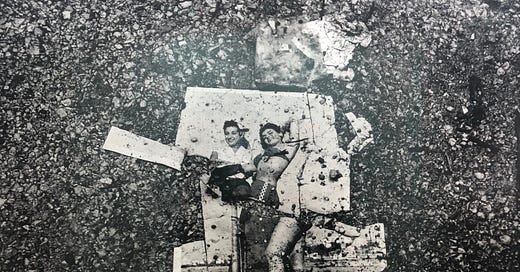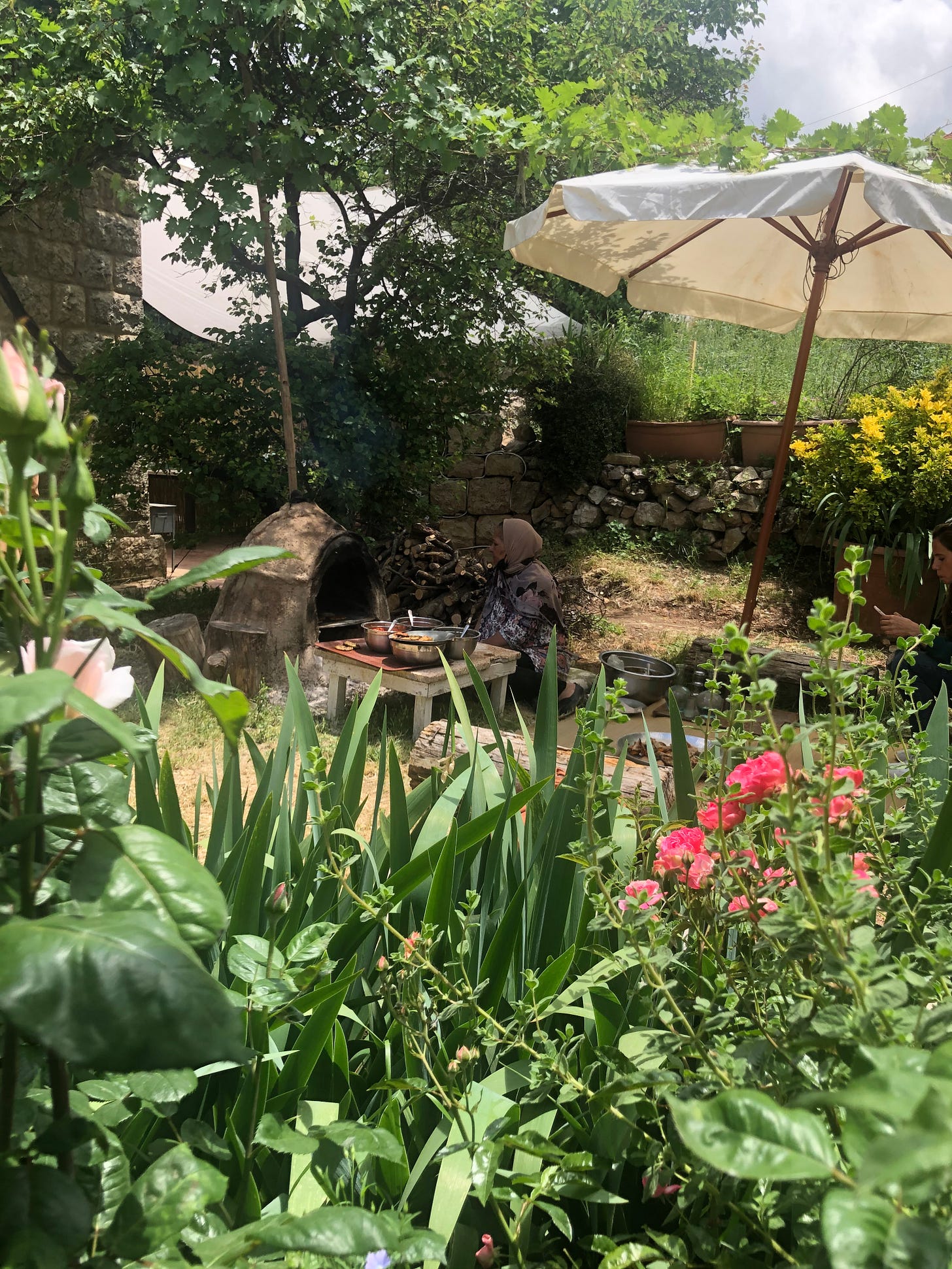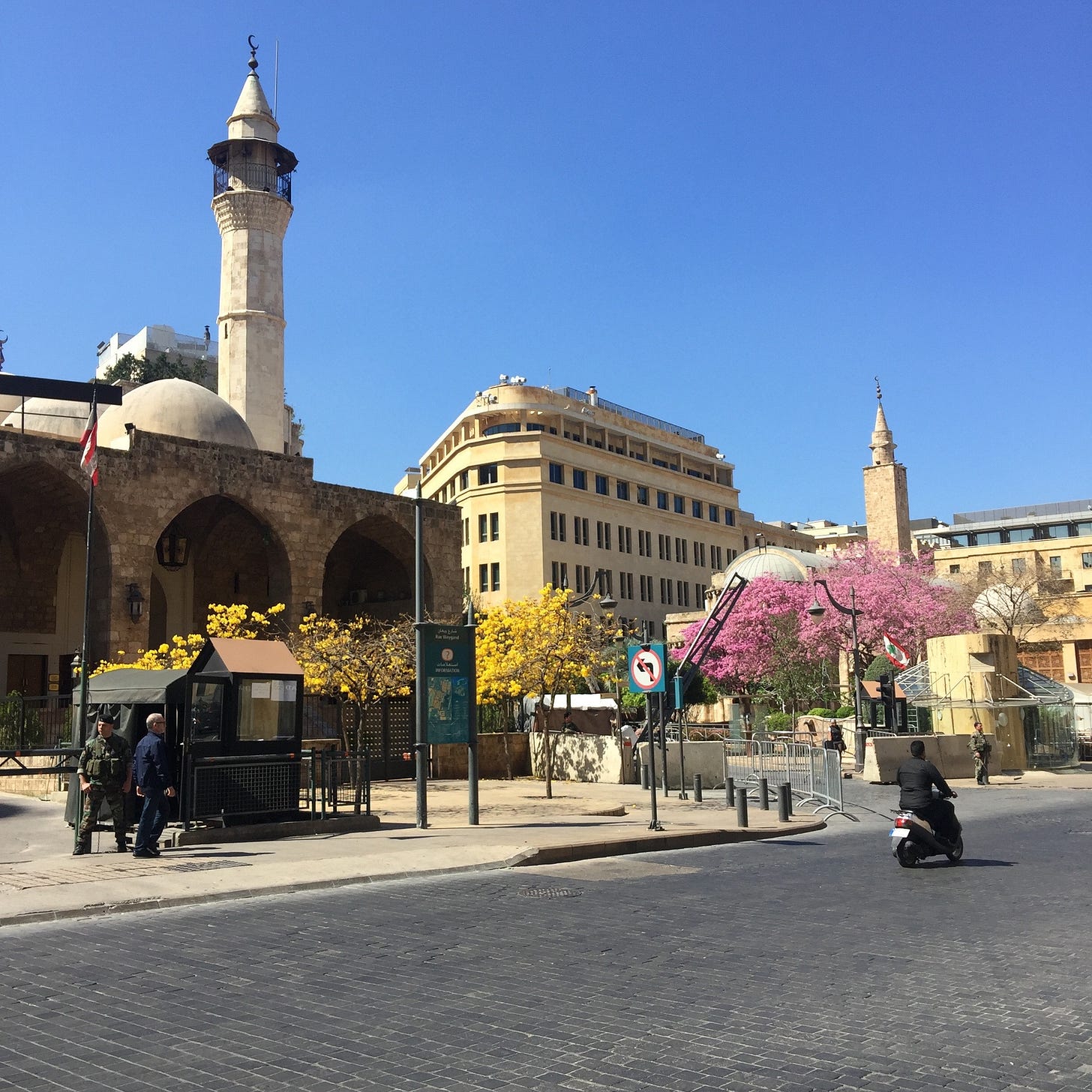Permission in the Margins - letter four
A letter exchange with Farrah Berrou of A'anab that discusses who has the right to draw from the well of local cultural heritage (among other things)
This is part 4 in a 6-part correspondence between Lebanese American wine expert and cultural observer Farrah Berrou and me. We continued our conversation earlier this week in letter three and this is my reply. We will continue the back and forth for three weeks on the topic of who holds the keys to cultural heritage. Farrah and I have known one another, mostly from afar, since 2018 when we met at a supper club in Beirut, and I’ve been a fan ever since.
Dear Farrah,
I’m desperately late in answering you, but alas we’re entering new territory, taking a sharp turn towards a great unknown, as the war that has been waged along the southern border of Lebanon for the past year has expanded dangerously in the days since you wrote me. I’ve been feeling absolutely flummoxed, not able to focus well, the simplest tasks hard to finish, and well, articulating how I feel about what’s happening and relating it to the theme we chose of cultural permissions, almost impossible.
Not to be dramatic, but every time I hear about a new Israeli strike, I imagine in my head what their target looks like. What was the story of the family that is now beneath the rubble? Did the columns at Baalbek come crashing down yet? How much more can be lost? It hurts when I see the beautiful land being pockmarked with Israeli bombs and the oh, so familiar highway from the south leading to Beirut, really more a parking lot, full of people I don’t know but feel I somehow do. Sights I know and love being demolished, balcony curtains flapping uselessly in the bombs’ impacts, the elderly and infirm seeking refuge on thin mattresses on school floors, families huddled on the corniche with no where to go, and the government (what government?) in no position to do anything. On Instagram I’ll hear about a strike at a particular location and can see myself driving along that exact stretch of land, looking out at the sea, and the riotous flowers framing my view. I’m heartbroken.
My husband is in Beirut working, has been since the day after the pager attack. We talk in fits and spurts, mainly just me checking in to make sure he’s still ok. He’s still relatively safe, but with the Israelis you never know what might tickle their sick fancies next, and journalists have been a repeatedly juicy target for them over the past year. He tells me about the man who handles the laundry at the hotel he’s staying at. On the first day of last week’s offensive the man lost 36 members of his family. A manager at the hotel told him about spending 19 hours on the road trying to bring his family from the South to the relative safety of Beirut. These are just two stories among the thousands and thousands and I just want to scream in the faces of all the people justifying this war, supplying weapons to the Zionists, or simply putting their heads in the sand and not seeing (caring), much less speaking up about what’s happening.
Meanwhile, I’ve been thinking a lot about your question of American culture and how/if it exists. A scene from the first episode of the terrible Aaron Sorkin show Newsroom kept coming to mind as the lead character lectures a doe-eyed co-ed about why America is no longer the greatest country on earth but could be. When I originally watched the show 12 years ago, this melodramatic monologue struck a chord, you likely would have caught me nodding vigorously in agreement, but I have to say that especially over the past year, all of these odes to democracy, and leading the world to the light, and human rights, and capitalism, and on and on have soured badly for me. I had bought in to many of the original ideals of the United States and thought they were ones we should all strive for. I don’t anymore….mostly because the United States itself has never lived up to those ideals. The model is full of hypocrisy, double standards, and greed.
America feels like a stranger to me these days. About living in LA you wrote: “In the Valley, I didn’t trust my surroundings and I felt alone a lot. I went there knowing I didn’t want to stay but nothing swayed me from the feeling that I don’t fit in here and I don’t want to.” I could write the same paragraph about me and my hometown of Decatur, Illinois, a place I was born and went to college in but feel like an alien dropped from Mars when I visit. For whatever reason I felt 1000 times more at home living in Beirut, a place I have no ties to whatsoever. I always kind of joked that as a third-culture-kid, Lebanon made sense to me because it is in a way a third-culture-country (not that that really exists). It is a place of contradictions, multiple cultures, and traumatic experiences. However I totally get your point that while I was greeted warmly by the Lebanese, not everyone gets that same reception.
In thinking about place a wise friend of mine whose mother is British married to a Lebanese man wrote me this after my last letter to you:
It’s always harder in closed societies. The village has fewer non villagers… hahahaha!! I guess Beirut now is more diverse and as a port city more open. But then again, this question of appropriation is such an issue these days. By celebrating our differences, we seem to be becoming way more closed and separate. This whole new movement in the world seems to be more insular and exclusionary somehow. We need to show what makes us different instead of celebrating what makes us the same. We are citizens of the world and the more we learn the better we become, at least that’s how I see it.
In many instances I do find that the sense of wonder and curiosity has been replaced by cynicism and a closing in on ourselves. I do understand where this all stems from, but is this protectiveness worth the price? I don’t have an answer….do you?
Often I get messages from people in the US thanking me for sharing the beauty of my world over here. Sometimes I feel like I’m an unwitting ambassador, trying so hard for people to see these places and their people as I do. I shared an Instagram post last week filled with photos of random, wonderful people I encountered in Lebanon because I want so badly for others to know that these places being bombed and hollowed out are full of human beings just like them. Perhaps I work so hard at all this because selfishly I crave that people to see ME too. Like you said, I’m not just one thing, but that’s difficult to convey. But I hope against hope that perhaps people start to slow down enough to look at people as individuals. However, I’m finding that the more information is available to people because of the internet and social media, the more guarded they are, the less they inquire and seek information. LOOK at the people. See us. None of us are caricatures.
I’m just glad to have gotten any kind of response off to you, Farrah. What a week it’s been, with no sign of it getting better. I’d write a paragraph one day and then events would happen that made what I’d written obsolete and frankly, for a couple of days every time I sat down to write I’d just tear up at the thought of what’s happening there. Instead I organized my closet, my spice rack, puttered around my balcony garden, worked on menus (although I don’t have much of an appetite myself) - anything to avoid sitting and thinking too much. Writing it down though is important, memorializing this moment and sharing it with those outside of here is the least I can do.
May you and your family stay safe, and may Lebanon see better days. Write back when you’re feeling up to it. Sending love.
xx CSJ








Have sent this to a few friends Sally - a poignant one.